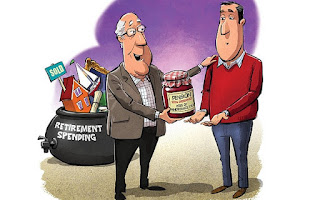After over 40 years of workingyou’re looking forward to your retirement. And why not? You’ve paid your taxes and saved diligently to make sure you’ll live comfortably when you retire. But you’re worried that the taxman may take more than his fair share of your estate when you die. What can you do to prevent this?
One of the best ways to reduce Inheritance Tax (IHT) is to set up a Trust and put some of your cash, investments and property into it. The value of a Trust is deemed to be no longer part of your estate for IHT purposes. But be careful because setting up a Trust can be quite tricky. It’s best to take advice from yourchartered accountant, estate planner or inheritance tax specialists.
If you think your estate might have to pay inheritance tax in due course, then here are a few reasons why setting up a Trust makes good financial sense.
How a Trustcan benefit your IHT exposure
A Trust could be set up to pay for a grandchild’s education, or for the support of a family member who may have a disability, or to help reduce the effects of Inheritance Tax. A Trust is a useful IHT planning tool for the next generation. To understand how a Trust works, let’s look at a typical example.
Here, we have a family where the husband has considerable assets. If he places these assets in trust prior to his death it won’t affect his own IHT liability but it can substantially reduce the amount of tax his widow will have to pay when she dies. The husband can also keep control of his assets while he’s alive.
When the husband’s widow eventually dies, only those assets that have been transferred out of the Trust into her direct ownership are counted as part of her estate and liable for Inheritance Tax. By transferring assets if and only when necessary, it’s possible to keep the widow’s estate below the IHT threshold, even though the Trust may hold a much larger sum.
One of the rules of a Trust states that no potential beneficiary can have an ‘absolute entitlement’ to any of the assets. Instead, all transfers out of a Trust have to be made at the discretion of the trustees and they must all be in agreement.So, when setting up a Trust be very careful who you appoint as trustees. It only takes one person – a stepson or daughter who has a gripe with the widow – to vote against a transfer of funds. It’s recommend that at least two people are appointed as trustees. One of these could be a family member and the other a professional such as a solicitor.
The husband can write a ‘letter of wishes’ to the trustees setting out how he’d like the Trust‘s assets to be dealt with, but because beneficiaries have no absolute entitlement to any assets, the trustees do not have to follow the wishes contained in the letter.Trusts are normally wound up either after two years of the first spouse’s death or when the surviving spouse dies. When this happens, the remaining assets are dealt with according to the wishes letter.
Protect yourself with expert advice
As the rules around IHT exemptions are complicated, it’s best to consult your accountant or solicitor to see how much tax you could save by setting up a Trust. One of the strange things about a Trustis that the Trustitself may, in certain circumstances, have to pay Inheritance Tax, and the trustees, whoever they may be, might be liable to pay income tax at a rate of 45%.
Suffice to say that the rules around Trustareextremely complicated and not to be taken lightly, so don’t be foolish, take advice from a professional in these matters.
Capital Gains Tax (CGT)
If you transfer property into a Trust, be careful because there may be CGT implications. However, CGT does not apply if you establish the Trustin your Will. Speak to your accountant about this.
Life Insurance
One of the best things you can do is take out an insurance policy on your life. This won’t lessen the amount of IHTyour estate may have to pay, but your insurance settlement will definitely make it much easier for your surviving family to pay the Inheritance Tax bill.
The lumpsum amount from the insurance policy could prevent the family home from having to be sold to cover the IHT bill. But if you do take out a policy, make sure the proceeds are paid directly into trust – if you don’t it will increase the size of your estateand as a result more tax will become payable!
This article was written by Dakota Murphey, an independent content writer who specialises in family law.

No comments:
Post a Comment